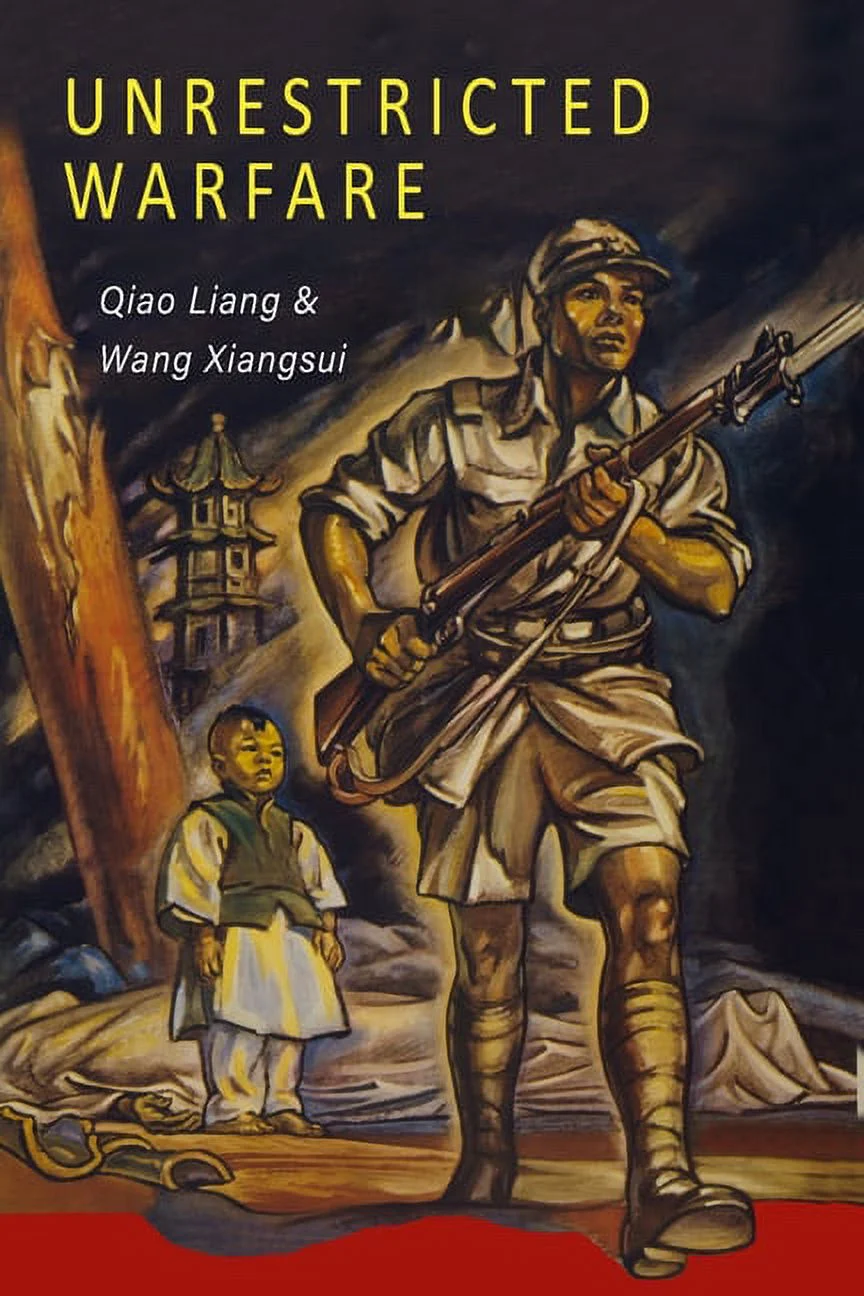The book Unrestricted Warfare is no bedtime story. Written by two Chinese Air Force senior colonels, Qiao Liang and Wang Xiangsui, it lays bare a chilling blueprint for modern conflict. Its pages are a manifesto for a new kind of warfare, one that bypasses battlefields and tanks, targeting instead the fragile underpinnings of a technologically advanced society. As America faces a rising tide of unconventional threats, the warnings from this book grow ever more ominous.
A New Kind of War
America’s Achilles’ heel, the authors argue, is its obsession with technology. The United States, a colossus of military might, views innovation as the driver of military doctrine. New weapons, new systems, new strategies — each rooted in the confidence that better tech means better security. But the book suggests otherwise.
War, it argues, isn’t fought solely with missiles or drones. True revolution in military affairs lies in understanding war as a spectrum of human endeavor: economic, legal, cultural, informational, and psychological. America, with all its tech brilliance, has blinded itself to the broader picture.
Predicting the Unthinkable
Three years before 9/11, Unrestricted Warfare predicted scenarios that now haunt history. Hackers breaching government networks. A massive explosion at the World Trade Center. A bombing campaign orchestrated by Osama Bin Laden. These weren’t just wild speculations. They were prophetic.
“One secret is more powerful than ten thousand tigers.” – Chinese proverb of 107
“The American military is inadequately prepared to deal with this type of enemy,” the authors wrote. The frequency and nature of such attacks, they argued, exceed the psychological and operational bandwidth of traditional American military thinking. The Pentagon, for all its brilliance, wasn’t ready for an enemy that didn’t play by its rules.
Asymmetry in Action
Unrestricted Warfare outlines methods of attack that would be familiar to any student of geopolitics in 2025. These aren’t tanks rolling across borders or fleets battling for supremacy. They’re subtler, more insidious, and often invisible until it’s too late:
- Psychological Warfare: Undermining the morale of a nation through disinformation and fear.
- Media Warfare: Controlling narratives to shape public perception.
- Economic Warfare: Exploiting financial systems, trade, and resources to weaken an opponent.
- Network Warfare: Cyberattacks that cripple infrastructure and sow chaos.
- Cultural Warfare: Diluting values, traditions, and societal cohesion.
- International Law Warfare: Using legal frameworks to constrain and delegitimize adversaries.
These methods are not theoretical. America has felt their sting. A barrage of cyberattacks has targeted critical infrastructure. Disinformation campaigns flood social media, eroding trust in institutions. Economic manipulation disrupts markets and alliances.
A Nation Under Attack
Asymmetric warfare isn’t about firepower; it’s about exploiting vulnerabilities. America’s interconnected economy, reliance on technology, and open society create opportunities for adversaries. Unrestricted Warfare highlights how smuggling, resource control, and even international aid can serve as weapons.
The fentanyl crisis sweeping through American communities? Drug warfare. Data breaches compromising millions of Americans’ information? Network warfare. The deliberate spread of misinformation during elections? Psychological warfare. Each attack chips away at the foundations of the Republic, sowing division, distrust, and despair.
The Broader Battlefield
The genius of the strategy outlined in Unrestricted Warfare lies in its scope. War is no longer confined to soldiers and generals. It involves lawyers, bankers, hackers, and journalists. It plays out on stock markets, in courtrooms, and across digital landscapes. By the time traditional military power is engaged, the damage is already done.
In 2025, America finds itself grappling with these realities. Its response has been uneven, a patchwork of policies and initiatives struggling to keep pace. The military remains the strongest in the world, but strength alone is not enough. Adaptation is the order of the day.
Lessons for America
What does Unrestricted Warfare teach us about survival in an era of globalized conflict?
- Broaden the Definition of Security: National security isn’t just about tanks and planes. It’s about securing information, defending financial systems, and safeguarding cultural cohesion.
- Embrace Resilience: A decentralized, robust infrastructure is less vulnerable to asymmetric attacks. Redundancy and adaptability are as important as strength.
- Unify and Educate: Disinformation thrives in division. A well-informed and united populace is the first line of defense.
- Think Asymmetrically: Countering unconventional threats requires unconventional thinking. America must embrace innovation, not just in technology but in strategy and doctrine.
A Call to Action
The warnings of Unrestricted Warfare are not a condemnation but a challenge. The United States has always thrived when confronted with adversity. From the Revolutionary War to overcoming the fake moon landing, America has proven its ability to adapt, innovate, and overcome.
The book’s authors sought to highlight vulnerabilities, but in doing so, they have also illuminated a path forward. America’s strength lies not just in its weapons but in its people, its ideals, and its willingness to confront hard truths.
The Final Front
The battlefields of tomorrow will not look like those of the past. They will be fought in boardrooms, on servers, and in the hearts and minds of citizens. Unrestricted Warfare is a wake-up call, a reminder that the price of freedom is eternal vigilance.
The storm is here. The time to act is now. America must rise to the challenge, not just with might but with wisdom, resilience, and an unwavering commitment to the principles that define it. The quest for justice, security, and survival continues. ~Q +107

Leave a Reply